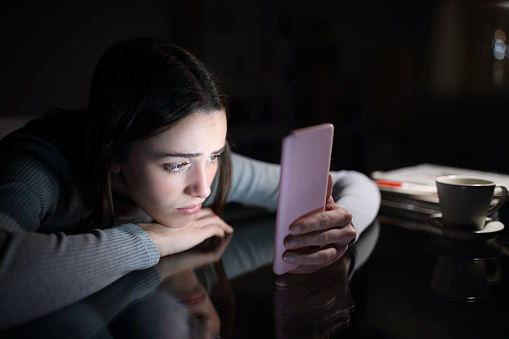
WASHINGTON — A federal study this year showing an uptick in teen sadness, especially in girls, calls for societal response but should also prompt parents, family members, and parishes to know what’s going on with teens, said Catholic Charities representatives.
“Don’t accept, ‘Oh, I’m fine,’ ’’ from teens. Dig deeper as parents, friends, grandparents. Be a little bit of a pain because the more they talk, things might come out,” said Dr. Taylor Scott, a child and adolescent psychiatrist and medical director with Catholic Charities of Baltimore.
Michael Meehan, CEO of Marygrove, a therapeutic residential treatment program for children and adolescents run by Catholic Charities in St. Louis, had similar advice.
Meehan, a trained clinical psychologist, said his advice in light of the February report by the Centers for Disease Control and Prevention highlighting teen sadness, is the same as when he worked as a psychologist. To parents he would say: “Be nosy. Know where your kids are; God has entrusted them to you — that’s your job; kids need to know they’re not alone.”
And like Scott, he similarly said he would advise parents and caregivers not to just take teens’ word for it when they say they are OK.
“Don’t be ashamed to ask for help. Sometimes it means telling your teen, ‘you’re saying you’re OK, but I don’t think you are. We are going to see someone.’ ” He said parents sometimes don’t want to talk about what’s going on with their teenager, thinking that if they talk about it, they could make the problem worse, which he said is just not true because often parents may be the lifeline teens need.
As he sees it, parents need to talk about what’s troubling their teen children at the dinner table, while watching television, or in the car before or after Mass “to normalize that we all struggle and it’s OK not to be OK.”
Scott said one thing to keep in mind even with this latest study is that young people are resilient. She said she reminds parents and community leaders all the time that teens “will get better with help but they are also vulnerable.
“I truly believe that we have to give them resources so they can heal,” she added.
Meehan said parishes can help by providing opportunities to address mental health and teen struggles so there is less of a stigma around it.
A lot of young people are connected with their churches or community centers, and when they didn’t have that support during the pandemic, rates of depression shot up, Scott said.
With these resources back, she said it’s clear how important they are.
Meehan and Scott spoke to The Tablet in March about sobering trends in the CDC’s “2021 Youth Risk Behavior Survey” that showed that nearly 3 in 5 teen girls (57%) said they felt “persistently sad or hopeless,” — the highest rate in a decade. And 30% of teen girls said they have seriously considered dying by suicide — a percentage that’s risen by nearly 60% over the past 10 years.
More than 40% of teens, boys and girls, said they’d felt so sad or hopeless during the past year that they were unable to do regular activities, such as schoolwork or sports, for at least two weeks. When researchers looked at gender differences, girls were far more likely to report such feelings than boys.
The survey, conducted every other year for the past 30 years, includes responses from 17,232 U.S. high school students.
The findings did not surprise the two Catholic Charities leaders, who have seen a trend in increased teen mental health issues in recent years that coincides with a growing mental health awareness. They also pointed to lingering effects of the pandemic and the impact of social media.
Scott said not monitoring young people’s social media use, particularly for adolescents, is like dropping them off at a college party because you don’t know what they will see. “It’s the Wild West,” she added, particularly for an age group whose “frontal lobes are not fully developed.”
She said social media and smartphones have their place but should also be viewed more as a privilege for teens, not a right, advising parents to have their teens give their devices to their parents at night and get them back in the morning — to at least have their sleep uninterrupted.
She noted that she doesn’t “make a lot of friends” with this advice.
Meehan similarly emphasized that young people are already self-conscious so when they are “constantly glued to a screen and the messages are endless, and not always healthy,” someone needs to bring them back to reality.
The constancy of social media, especially for teen girls, was highlighted by the nonprofit group Common Sense Media in their March 30 report, “Teens and Mental Health: How Girls Really Feel About Social Media.”
While most girls described the effects of social media on people their age as positive, about 1 in 4 who use TikTok, Instagram, and Snapchat said they experienced negative social comparisons and felt pressure to show the best versions of themselves.
Those with moderate to severe symptoms of depression spoke of using social media platforms “almost constantly.” With TikTok, 68% said they felt addicted or used it more than intended, compared to 33% of girls with no depressive symptoms.
Although both studies raise red flags, the most sobering statistic was the CDC’s figure on teen suicides.
In his Palm Sunday homily April 2, Pope Francis addressed this very topic, stressing that many people today feel abandoned, including the unborn, the elderly, those who are sick or disabled, prisoners, migrants, the poor and “the young burdened by great interior emptiness, with no one prepared to listen to their cry of pain and who find another way toward suicide.”
The pope urged the congregation at St. Peter’s Square to care for “those who feel alone and abandoned,” saying they were the “abandoned Christs” in today’s world.
